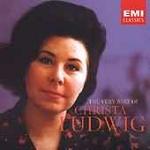I’ve had occasion to register disappointment with several releases in EMI’s “Very Best Of …” series, either because the selections weren’t worthy of the singer or because the transfers were inferior. This one, though, is a total success. Everything here is essential. Of course, some selections are more “essential” than others, but Christa Ludwig was an incredibly consistent singer. She must have had off-days, but few of them came when she was near a microphone. And unusual for this series, all selections are drawn from her prime years. The earliest is the “Presentation of the Rose” scene from the Karajan-led complete 1957 recording of Strauss’ Der Rosenkavalier, where her Octavian is partnered by the under-appreciated Teresa Stich-Randall’s Sophie; the latest is a 1970 Brahms lieder set with Geoffrey Parsons’ apt accompaniments.
The first disc opens with a trio of selections from Mozart’s Cosi fan tutte and moves on to the “Mira o Norma” duet with Callas from the stereo Serafin set, followed by a convincing “Liber Scriptus” from Giulini’s Verdi Requiem. Ludwig is an exemplary Ortrud in a selection from Kempe’s Lohengrin, and she’s a radiant Schubert/Schumann/Brahms lieder singer in 15 songs, highlighted by a luminous Schubert “Ave Maria” (only the “Erlkönig” slightly disappoints) and Brahms’ “Ständchen” and “Vergebliches Ständchen”.
Disc 2 is given over to Ludwig’s unique collaborations with conductor Otto Klemperer, opening with three arias from his complete St. Matthew Passion, a recording that continues to defy fashion and retain its “classic” status, in some part due to Ludwig’s singing, which is full of innumerable beauties and an inner spiritual glow. There’s also a powerful “Abscheulicher!…” from their Fidelio, still the best recording of that opera, where this great mezzo takes on a soprano role without missing a beat. An outstanding Mahler set includes an unforgettable “Von der Schönheit” from Das Lied von der Erde. But then, everything on these two discs is unforgettable, or as close to it as anyone has a right to expect, most especially three of Wagner’s Wesendonck Lieder, which make you pine for the two remaining songs in the cycle. Everything’s in stereo, so monophobes need not worry. At a two-for-one price, there’s no excuse for missing this glorious set.
































